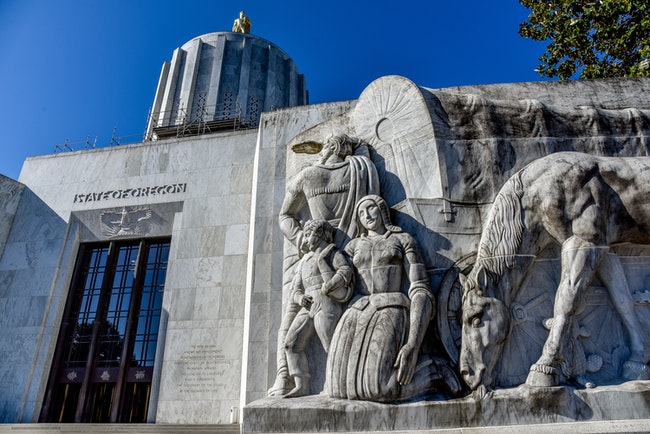 The Oregon Capitol (Salem Reporter archives)
The Oregon Capitol (Salem Reporter archives)
Rep. Dan Rayfield, D- Corvallis, wants to keep the campaign field for candidates level this year as courts and legislators untangle campaign finance reforms but he wants to short circuit a voter-approved measure to do that.
Dan Meek, a longtime campaign finance reform advocate, said Rayfield’s proposed legislation would overturn the wishes of Oregon voters while undermining efforts to rein in the freewheeling way state’s politicians raise money.
Oregon is one of a handful of states with no limits on how much money can be donated to political candidates. Rayfield’s legislation, House Bill 4124, comes at a time when Oregon could be on the cusp of enacting campaign finance reform.
The Oregon Supreme Court is considering a case that could reverse a previous decision that found that limits on campaign contributions violated the state constitution by infringing on free speech protections.
The ruling has stymied previous campaign finance reform attempts. In 2006, voters approved Measure 47, which limited how much individuals could give to candidates and prohibited unions and corporations from donating. But because voters didn’t approve an accompanying constitutional amendment, Measure 47 was blocked by the state Supreme Court from going into effect.
Rayfield said that there’s a question of whether those voter-approved limits would take hold if the Oregon Supreme Court decides campaign restrictions are constitutional
His proposes through his bill to delay the effects of Measure 47 until July 2021. If the court doesn’t reach a decision allowing campaign finance limits by then, his legislation would repeal Measure 47 despite its approval by voters.
In emails and an interview, Meek said that the proposal is an attempt by politicians to dodge meaningful campaign finance reform.
“That will give politicians the entire 2020 election cycle to avoid any of the Measure 47 limits and will give the 2021 full session of the Oregon Legislature plenty of time to eviscerate the contribution limits desired by Oregon voters,” said Meek in an email.
But Rayfield outlined a scenario the bill seeks to avoid.
He said its likely the Supreme Court would decide on campaign finance limits in March or possibly over the summer. He said that if the court determines that campaign finance limits are constitutional, that would set off another legal battle about what portions of Measure 47 can be implemented. He said that likely won’t be settled until August or September – the middle of an election season.
Rayfield said the secretary of state, who oversees elections, would have to figure out what parts of Measure 47 to implement. He said it’ll also create an inequitable situation where candidates who file to run earlier can raise unlimited amounts of money.
But if campaign limits then go into effect, candidates who had a later start would be impaired. He said that would particularly affect third parties, which nominate candidates later than major parties, as well as replacements for politicians who’ve dropped out of their races.
“They are stuck with these limits and they are in a patently unlevel field to compete with other folks,” Rayfield said. “There are probably legal issues with how unfair that is.”
The Legislature has been reluctant to undo laws enacted through voter-approved ballot measures. Rayfield said that his bill would give lawmakers time in the 2021 legislative session to craft new campaign finance regulations. In November of this year, voters will again consider a constitutional amendment to allow campaign finance reform.
He said that the regulations could be based on Measure 47. But he pointed to a legal opinion by a legislative lawyer that found that Measure 47 remain vulnerable to a court challenge.
His bill also calls for a 17-member task force to come up with a new campaign finance rules. The task force would include legislators and representatives of major political parties, businesses and nonprofits. Unaffiliated voters and campaign finance reform advocates would each get one representative.
Meek called the legislation an “anti-reform bill” and likened the task force’s composition to a “textbook example of foxes guarding the henhouse.”
Contact reporter Jake Thomas at 503-575-1251 or [email protected] or @jakethomas2009.









